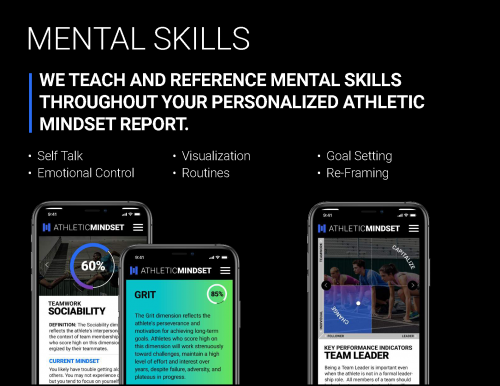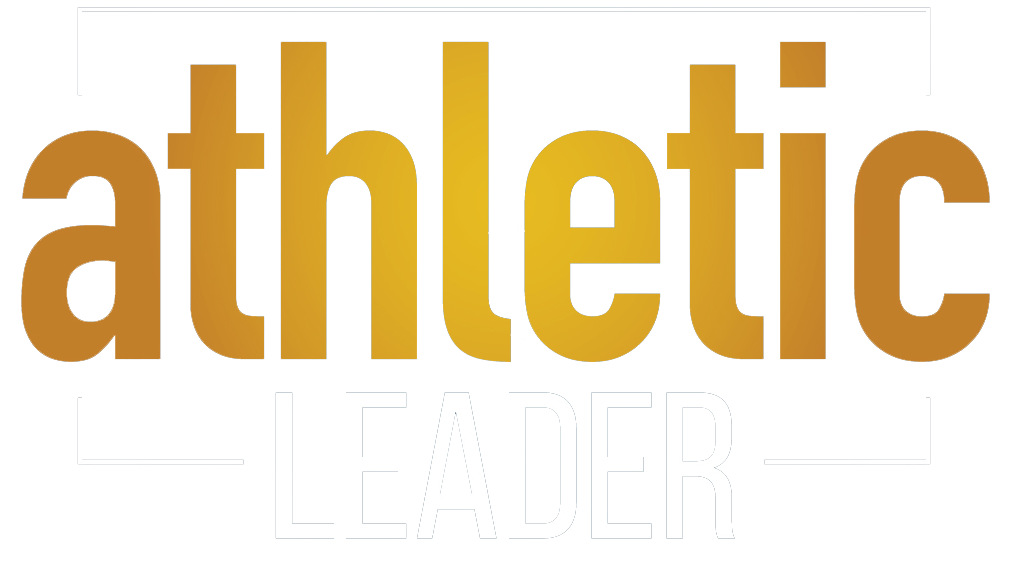Athletic Mindset impacts student-athlete mental health
The Athletic Mindset Assessment believes everyone has the potential for greatness—you just have to know how best to tap into it. That’s why they created this affordable yet powerful software that gives you all the information you need in one convenient place.
They’ve taken the latest trends in sport and organizational psychology that have been proven to improve athletic performance and developed an interactive reporting system known as Athletic Mindset; which delivers unparalleled insights into how an athlete, team, or organization think.
 The Athletic Mindset measures key areas of how the human mind operates during an athlete’s preparation, competition, and interaction with their teammates and coaches. It has been developed and validated with the latest standards in psychometrics and psychological theories of performance.
The Athletic Mindset measures key areas of how the human mind operates during an athlete’s preparation, competition, and interaction with their teammates and coaches. It has been developed and validated with the latest standards in psychometrics and psychological theories of performance.
For the latest installment of Coach & Athletic Director’s TechTime on-demand series, managing editor Wesley Sykes was joined by Casey Cittadino, CEO of Athletic Mindset, Liz Beville, head women’s lacrosse coach Le Moyne College, and Mindy McCord, head women’s lacrosse coach at University of South Florida, to discuss integrating the Athletic Mindset software into their programs, the results they’ve seen, and how it can boost athletes’ on-field performance.
Athletes who have strong mental performance see better results. Athletic Mindset’s strategy and development system are designed to equip athletes and teams with new ways of thinking and controlling their mental performance. Implement the new mental strategies and reach peak performance.
Below is an excerpt Q&A from the full TechTime discussion.
 How does understanding an athlete’s makeup contribute to their overall performance and growth?
How does understanding an athlete’s makeup contribute to their overall performance and growth?
Mindy: It’s a game-changer. It’s the most important thing from the standpoint of time devoted to the physical and technical aspects. How much time are we spending on mental skills? Coaches have to prioritize this. And once they do they’ll see their athletes feel more in control of their mental game. You can support their mental game by working through areas where they are showing weaker scores. It also gives you an opportunity to talk through things. A player may receive a low score and tell their coach, “I know this is a low score, but this isn’t really me or how I’m feeling.” I think it’s been transformational by dedicating some time to it and you enter a holistic mindset for athlete development. And when you look at the highest levels of sport, all the athletes are physically strong and technically strong, but what separates the best from the rest is their mental strength and control of what’s between the ears. This program helps to define that.
Liz: When I looked back at previous results a player who was injured jumped to mind. To look at her scores and her confidence and some of the other benchmarks the program measures, I wasn’t surprised. She was injured to the point that she couldn’t practice. It’s all about growth—not just where they start, but where they end. And that’s the point of the program. Even though that player was injured and we couldn’t see growth on the field, we can still help her grow from a mindset standpoint. The injured athlete is important because they are on the sidelines with an attitude. Is that a positive or negative attitude? I think understanding where they are coming from while doing these surveys and getting these scores is really important. It can be a big factor in how your team does and how successful they are.
What’s been the student-athletes’ reception of using the Athletic Mindset software?
Liz: We started using this software back in my first year at Le Moyne. It was tough because it was during COVID, so we had a little different experience with it. But when we would have meetings with our student-athletes and review the results, we’d talk about what was going on and they would say, ‘Oh, I get it now.’ I think it’s similar to when a little kid doesn’t want to listen to their parents, but they hear the same advice from someone else and it clicks for them. We’ve been saying these sorts of things, but to see it on a different platform. So while they were unsure about the software at first, they ultimately found it to be a successful tool for them.
Mindy: We were using the software at Jacksonville University and are implementing it now in South Florida. And I think that the great thing about this software is that you can get your athletes started on it before the season starts or before they even enter your program. And you can learn a lot about  them. I think it’s also important for your athletes to understand that the data is not being used against them. It’s being used for them so that we can understand how they think. I’ve been coaching for more than 30 years, and I can guess how a player is going to think, but this program can put you years ahead of the curve in coaching your athletes because you can learn how they think prior to even their first training session with the program.
them. I think it’s also important for your athletes to understand that the data is not being used against them. It’s being used for them so that we can understand how they think. I’ve been coaching for more than 30 years, and I can guess how a player is going to think, but this program can put you years ahead of the curve in coaching your athletes because you can learn how they think prior to even their first training session with the program.
What is one key takeaway you’d like the audience to know about the Athletic Mindset software?
Casey: I’m not fully aware of what it means to be an athletic director or handle athletic budgets, but I can tell you that when you invest in your players and your developing them mentally, I think it’s going to come back to you full-fold as a coach when you see the performance on the field. In today’s day and age of NIL and athlete’s looking to get paid, and scholarship dollars – every dollar is really important. Where you use your budget matters. I think this is a great investment for a coach or an athletic director when looking at an entire department.
Liz: Investment is huge. Whether that’s Athletic Mindset or your scouting or whatever you’re doing to improve your team. You have to invest back into your student-athletes. As a coach, this helps you develop too. It’s for your student-athletes, but it’s also for you to grow as well. Kids are different. They are coached differently than how we were coached growing up. It’s a tool that everyone can learn from.



